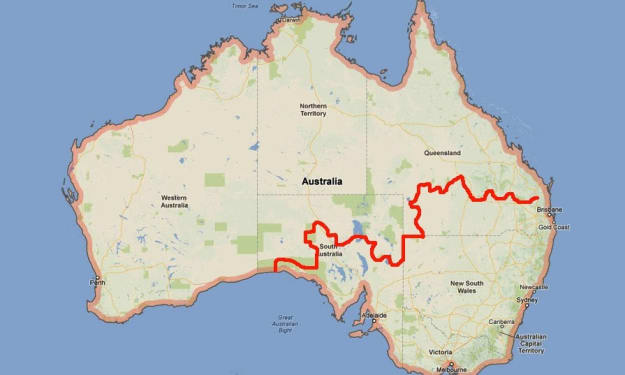The African Continent is splitting into two
An underground ocean in East Africa may split the African Continent

The formation of oceans and continents is a result of the movement of Earth’s tectonic plates. These plates are constantly moving, colliding and separating, creating geological features that shape our planet’s surface. Millions of years ago, one such tectonic event led to the formation of a body of water known as the Atlantic Ocean. This separation of landmasses also played a role in the possible future splitting of Africa.
The history of the formation of the Atlantic Ocean can be traced back to the breakup of the supercontinent Pangea, which occurred some 200 million years ago. At that time, Pangea was the only landmass on Earth, and the supercontinent was surrounded by a vast ocean called Panthalassa. Due to tectonic forces, Pangea began to break apart, and the pieces drifted away from each other. Over time, this separation created the world's current ocean basins and continents.
The breakup of Pangea resulted in the formation of several rift valleys, including the one that runs through the African continent. This rift has been active for millions of years, and it continues to widen slowly. The African continent is now being pulled apart along this rift, which extends from Kenya in the north to Mozambique in the south.
Some geologists believe that the separation of the African continent could eventually lead to the formation of a new ocean, which would split Africa into two parts. This process is known as rifting and can be seen as a precursor to the formation of new ocean basins.
The East African Rift System is the most prominent of such rifts, and it is located at the border of the African continent where plates are diverging. As these plates move apart, the pressure in the underlying mantle is released, and magma rises to the surface, creating volcanic activity. This process could eventually result in the formation of a new ocean basin.
The idea of a new ocean basin forming in Africa is not a recent one. In fact, scientists have been studying the process of rifting for over a century. The concept gained prominence in the 1960s when plate tectonics theory was developed and has since become an area of considerable interest, with many researchers studying the possibility of a new ocean forming in Africa.
While the formation of a new ocean may take millions of years, scientists have identified several stages in the process. The first stage is the early rifting stage, where tensional stresses cause the crust to thin and fracture. The second stage is the magmatic stage, where magma rises to the surface and volcanoes form. The final stage is the oceanic stage, where the rift becomes flooded with seawater.
It is important to note that the formation of a new ocean is a slow process and could take several million years to occur. Moreover, despite the gradual buildup of tension and the slow stretching of the Earth’s crust, it is still unclear whether Africa will split or not. These are complex processes, and many factors are at play.
However, the possibility of a new ocean forming in Africa has significant implications for both the physical geography of the continent and the people living in the region. Such a development could potentially affect the climate, local weather patterns, and ecosystems, as well as have implications for access to resources and national boundaries.
In conclusion, the formation of oceans and continents is a result of the movement of Earth’s tectonic plates. The separation of landmasses is a natural process, and the possibility of a new ocean forming in Africa is one such example. While it is not clear whether this will happen or not, understanding the process behind it remains important for future research on the geological evolution of our planet.
About the Creator
Sylvester Phoenix
The story of my life is a reference book. Follow me and lets make the world a better place.






Comments (1)
that would increase the continent counts but submerged and lost cities will be inevitable.